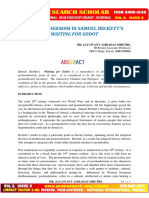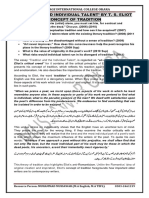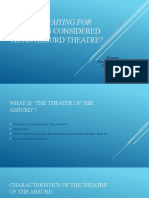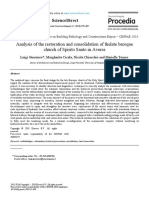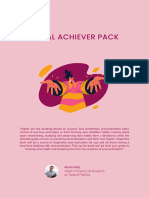0 ratings0% found this document useful (0 votes)
228 viewsThe Birds
The Birds
Uploaded by
acdparribanglah1) Aristophanes' comedy play "The Birds" is a work of political satire that criticizes various aspects of Athenian society in the 5th century BC.
2) The play uses bird characters to symbolize human folly and the desire for power. It mocks corrupt politicians, excessive bureaucracy, and the manipulation of the masses.
3) Aristophanes satirizes prominent figures like Cleon and holds up a mirror to human nature, highlighting traits like greed, ambition, and the ease with which people can be swayed. The play explores themes of human folly and the destructive potential of desires for wealth and power.
Copyright:
© All Rights Reserved
Available Formats
Download as DOCX, PDF, TXT or read online from Scribd
The Birds
The Birds
Uploaded by
acdparribanglah0 ratings0% found this document useful (0 votes)
228 views8 pages1) Aristophanes' comedy play "The Birds" is a work of political satire that criticizes various aspects of Athenian society in the 5th century BC.
2) The play uses bird characters to symbolize human folly and the desire for power. It mocks corrupt politicians, excessive bureaucracy, and the manipulation of the masses.
3) Aristophanes satirizes prominent figures like Cleon and holds up a mirror to human nature, highlighting traits like greed, ambition, and the ease with which people can be swayed. The play explores themes of human folly and the destructive potential of desires for wealth and power.
Copyright
© © All Rights Reserved
Available Formats
DOCX, PDF, TXT or read online from Scribd
Share this document
Did you find this document useful?
Is this content inappropriate?
1) Aristophanes' comedy play "The Birds" is a work of political satire that criticizes various aspects of Athenian society in the 5th century BC.
2) The play uses bird characters to symbolize human folly and the desire for power. It mocks corrupt politicians, excessive bureaucracy, and the manipulation of the masses.
3) Aristophanes satirizes prominent figures like Cleon and holds up a mirror to human nature, highlighting traits like greed, ambition, and the ease with which people can be swayed. The play explores themes of human folly and the destructive potential of desires for wealth and power.
Copyright:
© All Rights Reserved
Available Formats
Download as DOCX, PDF, TXT or read online from Scribd
Download as docx, pdf, or txt
0 ratings0% found this document useful (0 votes)
228 views8 pagesThe Birds
The Birds
Uploaded by
acdparribanglah1) Aristophanes' comedy play "The Birds" is a work of political satire that criticizes various aspects of Athenian society in the 5th century BC.
2) The play uses bird characters to symbolize human folly and the desire for power. It mocks corrupt politicians, excessive bureaucracy, and the manipulation of the masses.
3) Aristophanes satirizes prominent figures like Cleon and holds up a mirror to human nature, highlighting traits like greed, ambition, and the ease with which people can be swayed. The play explores themes of human folly and the destructive potential of desires for wealth and power.
Copyright:
© All Rights Reserved
Available Formats
Download as DOCX, PDF, TXT or read online from Scribd
Download as docx, pdf, or txt
You are on page 1of 8
Political Satire
• Political satire is a form of humor or exaggeration that
criticizes or mocks the actions, policies, or personalities of
people or institutions involved in politics. Political satire can
be found in various forms of media, such as literature,
theater, film, television, cartoons, memes, and social media.
Political satire can have different purposes, such as
entertainment, education, persuasion, or protest.
• Political satire is important
• Political satire is important because it can raise
awareness, challenge assumptions, expose hypocrisy, and
inspire change in the political sphere. Political satire can also
provide a way for people to cope with the frustrations and
absurdities of politics, and to express their opinions and
emotions in a creative and humorous way. Political satire can
also foster critical thinking and democratic dialogue among
the public, as well as hold the powerful accountable for their
actions and words.
• Aristophanes was a comic playwright and poet of
ancient Greece, who is considered the greatest
representative and the only surviving example of the genre of
Old Comedy. He wrote about 40 plays, of which 11 are
extant. His plays are known for their witty dialogue,
fantastical plots, political satire, social commentary, and
theatrical innovation. He often ridiculed the prominent
figures and events of his time, such as the Peloponnesian
War, the Athenian democracy, the philosophers Socrates and
Euripides, and the gods and heroes of Greek mythology.
Some of his most famous plays are The Clouds, The Frogs,
Lysistrata, and The Birds.
•
• The Birds is a play by Aristophanes, which was
Satire on Corrupt Politicians
•
Aristophanes, a prominent Athenian comic playwright of the
5th century BC, employed his works to satirize and criticize
the prevailing social, political, and cultural issues of his time.
His plays were often infused with sharp wit and biting
commentary, exposing the foibles and flaws of Athenian
society. In his play "The Birds," Aristophanes takes aim at the
corruption that was prevalent in Athens, particularly among
its political leaders.
•
• One of the most prominent forms of corruption that
Aristophanes highlights in "The Birds" is bribery and graft.
This is evident in the play's opening scenes, where two
Athenian citizens, Pisthetaerus and Euelpides, are seeking
divine guidance to escape the chaos and corruption of
their city. They encounter Hoopoe, a bird who informs
them of a utopian bird kingdom in the clouds, far removed
from the troubles of Athens.
•
• Throughout the play, Aristophanes contrasts the idealized
society of the birds with the corrupt practices of Athenian
politicians. He portrays the birds as honest, cooperative,
and law-abiding, while the Athenians are depicted as self-
serving, greedy, and easily swayed by bribes. This contrast
serves to highlight the shortcomings of Athenian society
and the need for reform.
•
• In particular, Aristophanes targets the demagogue Cleon,
who was a prominent figure in Athenian politics during the
time of the Peloponnesian War. Cleon was known for his
aggressive rhetoric and his ruthless pursuit of power.
Aristophanes caricatures Cleon as a braggart and a bully,
exposing his hypocrisy and self-interest.
•
• Aristophanes's use of satire was a powerful tool for social
commentary. By exaggerating and ridiculing the corrupt
practices of Athenian politicians, he was able to expose
Satire on Democracy
• Peisetaerus
•
• Peisetaerus's character can be seen to relate to several
figures in Athenian political history. His intelligence and
persuasiveness are reminiscent of Pericles, the Athenian
statesman who dominated Athenian politics for much of
the 5th century BC. Pericles was a gifted orator who was
able to sway public opinion in his favor, and he was also a
shrewd politician who was able to forge alliances and build
consensus.
•
• Peisetaerus's ambition and drive also mirror those of
Alcibiades, another prominent Athenian politician of the
5th century BC. Alcibiades was a brilliant military
commander and a charismatic leader, but he was also
ambitious and unscrupulous. He was eventually exiled
from Athens for his role in a scandal, but he later returned
to play a role in the city's final years of independence.
• Euelpides
•
• Euelpides's character can be seen to relate to several
ordinary Athenian citizens of the 5th century BC. His
hesitancy and reluctance to participate in politics are
reminiscent of many Athenians who were content to leave
the running of the city to their elected officials. However,
Euelpides's willingness to follow Peisetaerus's lead
suggests that he was also capable of being engaged in the
political process when he was motivated to do so.
•
• Euelpides's skepticism towards democracy can be seen as
a reflection of the fact that Athenian democracy was not
without its critics. Some Athenians argued that democracy
was a mob rule that led to chaos and instability. Others
argued that democracy was only for the wealthy and
educated, and that it did not represent the interests of the
ordinary citizen.
•
Criticism of Athenian society
Aristophanes comedy play “ The Birds” is a brilliant piece of
political satire that tackles various social and political issues
of its time. The play, first performed in 414 BC, used the bird
characters to symbolize human folly and desire for
power.Here are few examples of political satire found In “The
Birds”.
1) Criticism of Athenian Society
Aristophanes presents the bird characters as disillusioned
with the city of Athens and its corrupt politics.Through
satire,he mocks the excessive bureaucracy,the court system,
and the greed of public
officials.
2) Parody of Athenian political figures
The play satirizes prominent Athenian politicians including
Cleon, whois depicted as a bird trader.Aristophanes mocks
theirthirst for powerand their use of rhetoric to manipulate
the masses, portraying them asbirds who create their own
Utopian society in the clouds.
3)Satire on human nature and greed
The play explores the theme of human folly, highlighting how
easily people can be manipulated and how their desires for
power and wealth often lead to destructive
consequences.The bird characters represent these flaws,
showing how human can be Scuayed by flattery, ambition,
and empty promisrs
You might also like
- Dain-5 AccessBodyProcessesIntroducedandExplained PDFDocument5 pagesDain-5 AccessBodyProcessesIntroducedandExplained PDFRiitta Knuuti95% (19)
- Case Analysis of Felix Ungar From The Odd Couple-CompDocument6 pagesCase Analysis of Felix Ungar From The Odd Couple-CompsobereverettNo ratings yet
- The Caretaker by Harold PinterDocument6 pagesThe Caretaker by Harold PinterLearn With UsNo ratings yet
- The Cherry Orchard Study Guide FinalDocument17 pagesThe Cherry Orchard Study Guide FinalkokottoNo ratings yet
- Summary & Questions For The School For ScandalDocument23 pagesSummary & Questions For The School For Scandal226881100% (4)
- Fefu and Her Friends by Maria Irene FornesDocument5 pagesFefu and Her Friends by Maria Irene FornesMadalina GorganNo ratings yet
- The Zoo StoryDocument4 pagesThe Zoo StoryNUR MARZAWANI BINTI JAFRI Pelajar KBMNo ratings yet
- SPG-MPS-007 BDocument14 pagesSPG-MPS-007 BLam NguyenNo ratings yet
- Role of ChorusDocument5 pagesRole of Chorushotmail1009No ratings yet
- The Birds - Aristophanes - Play Summary & Analysis - Ancient Greece - Classical LiteratureDocument6 pagesThe Birds - Aristophanes - Play Summary & Analysis - Ancient Greece - Classical LiteratureRuth MoTo100% (1)
- The Miseries of Modern Man: An Analytical Study of Edward Albee's The Zoo StoryDocument14 pagesThe Miseries of Modern Man: An Analytical Study of Edward Albee's The Zoo StoryHanieh Mehr Motlagh100% (3)
- Reference (I) Poem: A Constable Calls (Ii) Poet: Seamus Heaney ContextDocument2 pagesReference (I) Poem: A Constable Calls (Ii) Poet: Seamus Heaney ContextAisha Khan100% (1)
- Oedipus Tragic HeroDocument5 pagesOedipus Tragic HerongldhillonNo ratings yet
- Introduction To A Greek TragedyDocument15 pagesIntroduction To A Greek Tragedyg00zonjaNo ratings yet
- Oscar Wilde - The Importance of Being EarnestDocument62 pagesOscar Wilde - The Importance of Being EarnestDanica SpasicNo ratings yet
- Sight & BlindnessDocument7 pagesSight & BlindnessMd Mujib Ullah100% (1)
- The Fusion of Absurdity and Reality in Harold Pinter's The Dumb WaiterDocument6 pagesThe Fusion of Absurdity and Reality in Harold Pinter's The Dumb WaiterTJPRC Publications100% (1)
- DisgracedDocument6 pagesDisgracedDavid Rustam Asrorov100% (1)
- Essay Sonnet 65-RevisedDocument6 pagesEssay Sonnet 65-Revisedapi-350031340100% (1)
- Red OleandersDocument8 pagesRed OleandersSubham KumarNo ratings yet
- "Life of Galileo" As An Epic Drama.Document2 pages"Life of Galileo" As An Epic Drama.Muhammad SufyanNo ratings yet
- M EXPRESSIONISM IN THE HAIRY APE'Document2 pagesM EXPRESSIONISM IN THE HAIRY APE'tocscribdNo ratings yet
- Analyze The Image of Light and Drak in "Oedipus Rex"Document3 pagesAnalyze The Image of Light and Drak in "Oedipus Rex"Pri N Ce100% (1)
- Blood WeddingDocument13 pagesBlood Weddingnfatimah486No ratings yet
- S. Sulochana Rengachari - T S Eliot - Hamlet and His Problems - An Analysis-Prakash Book Depot (2013)Document50 pagesS. Sulochana Rengachari - T S Eliot - Hamlet and His Problems - An Analysis-Prakash Book Depot (2013)pallavi desaiNo ratings yet
- Post Modernism in Samuel Beckett'S: Waiting For GodotDocument3 pagesPost Modernism in Samuel Beckett'S: Waiting For GodotNuzaima Noor PuffinNo ratings yet
- A Game of ChessDocument19 pagesA Game of ChessJl WinterNo ratings yet
- Rosencrantz and Guildenstern As An Absurd DramaDocument2 pagesRosencrantz and Guildenstern As An Absurd DramaKingshuk Mondal50% (2)
- Six Characters in Search of AuthorDocument12 pagesSix Characters in Search of AuthoravaikalamNo ratings yet
- 588 - Oedipus Rex - Entire TextDocument17 pages588 - Oedipus Rex - Entire TextMuhammad Aulia RahmanNo ratings yet
- BTA-Book 1 Arms and The ManDocument2 pagesBTA-Book 1 Arms and The ManSushmita Singh Rathore100% (1)
- History of Drama Ancient DramaDocument4 pagesHistory of Drama Ancient DramavhanAileeNo ratings yet
- Theatre of AbsurdDocument10 pagesTheatre of AbsurdAqsa NomanNo ratings yet
- An Analysis of The Characters in Jean Genet's "The BalconyDocument5 pagesAn Analysis of The Characters in Jean Genet's "The BalconyLuiz Claudio CandidoNo ratings yet
- The Wild DuckDocument39 pagesThe Wild DuckKhalil AbdulhameedNo ratings yet
- The Caretaker Harold PinterDocument8 pagesThe Caretaker Harold Pinterlonesome100% (1)
- Antony and Cleopatra - WikiDocument24 pagesAntony and Cleopatra - WikiPrasanth VeluNo ratings yet
- Snake-Explanation and ThemesDocument16 pagesSnake-Explanation and Themesdeviljoy001No ratings yet
- Eliot's Concept of Tradition With Urdu ExplanationDocument4 pagesEliot's Concept of Tradition With Urdu ExplanationIrfan Baloch100% (1)
- Hamlet and His Problems 3Document2 pagesHamlet and His Problems 3chayanduttaNo ratings yet
- The Playboy of The Western WorldDocument19 pagesThe Playboy of The Western WorldTaniya Mondal0% (1)
- Shakespeare's Art of CharacterizationDocument10 pagesShakespeare's Art of CharacterizationFabashshir Tahsin DolaNo ratings yet
- Lesson 2 Aristotle's PoeticsDocument6 pagesLesson 2 Aristotle's PoeticsAva ChavezNo ratings yet
- Grand Style of "Paradise Lost" Book-I: Paradise Lost Are His Own and in Marked Contrast To Any Other English PoetDocument7 pagesGrand Style of "Paradise Lost" Book-I: Paradise Lost Are His Own and in Marked Contrast To Any Other English Poetthisisghostactual100% (1)
- Feminism in John Osborne'S Look Back in Anger'Document2 pagesFeminism in John Osborne'S Look Back in Anger'Mian Hamayun NawazNo ratings yet
- The Bridge Poem - Donna Kate RushinDocument7 pagesThe Bridge Poem - Donna Kate RushinSony chanNo ratings yet
- Accidental Death of An AnarchistDocument17 pagesAccidental Death of An AnarchistAmjad AliNo ratings yet
- Radiance - Louis NowraDocument27 pagesRadiance - Louis NowraAnindita XavierNo ratings yet
- Questions For MA English (Part 1)Document12 pagesQuestions For MA English (Part 1)Sidra KhanNo ratings yet
- Components of Drama and Oedipus Rex As ExampleDocument3 pagesComponents of Drama and Oedipus Rex As ExampleAmir Khan VlogsNo ratings yet
- Good Person of Szechwan EpilogueDocument3 pagesGood Person of Szechwan EpilogueTommyNo ratings yet
- Critical Analysis of The Poem by Ted HughesDocument4 pagesCritical Analysis of The Poem by Ted HughesKomal khanNo ratings yet
- Utopia - Summary: Utopia Is A Work of Political and Social Satire Written in Three SectionsDocument3 pagesUtopia - Summary: Utopia Is A Work of Political and Social Satire Written in Three SectionsShankar D P ShankarNo ratings yet
- Silent Trauma Representing Indian Partition in Subaltern Studies Bapsi Sidhwas Cracking IndiaDocument23 pagesSilent Trauma Representing Indian Partition in Subaltern Studies Bapsi Sidhwas Cracking IndiasaminaNo ratings yet
- Edward Albee - Life and CareerDocument9 pagesEdward Albee - Life and CareerCalin SoptereanNo ratings yet
- 3 Senses of CultureDocument2 pages3 Senses of CultureRajkumari ShrutiNo ratings yet
- Themes & Symbols in The Poem "The Waste Land"Document4 pagesThemes & Symbols in The Poem "The Waste Land"LinaNo ratings yet
- Thyestes: 'Be pitchy black the night, and let the day Fall fainting from the heavens and be no more''From EverandThyestes: 'Be pitchy black the night, and let the day Fall fainting from the heavens and be no more''No ratings yet
- Comparative Study of Shina and English Compounds-234-244Document11 pagesComparative Study of Shina and English Compounds-234-244acdparribanglahNo ratings yet
- Suffixation in The Inflectional Morphemes of Shina LanguageDocument21 pagesSuffixation in The Inflectional Morphemes of Shina LanguageacdparribanglahNo ratings yet
- SleliloqiesDocument20 pagesSleliloqiesacdparribanglahNo ratings yet
- Morality PlayDocument9 pagesMorality PlayacdparribanglahNo ratings yet
- Design and Implementation of An Intruder Detector in Homes With Audio and Sms Alert Using GSM ModuleDocument65 pagesDesign and Implementation of An Intruder Detector in Homes With Audio and Sms Alert Using GSM ModuleLANGATNo ratings yet
- Soul DomainDocument2 pagesSoul DomainMaciej WyroślakNo ratings yet
- Inorganic Chemistry ExpDocument46 pagesInorganic Chemistry Exppc355chyi100% (3)
- Santiago Vs PioneerDocument2 pagesSantiago Vs PioneerKaye Patrice Andes ApuyanNo ratings yet
- What Makes A Good Leader Thesis StatementDocument6 pagesWhat Makes A Good Leader Thesis Statementnlcnqrgld100% (1)
- Stat MCQDocument13 pagesStat MCQCornsyrup PlayNo ratings yet
- Đề thi vănDocument2 pagesĐề thi vănLê Minh CươngNo ratings yet
- Elementary Social Studies CurriculumDocument34 pagesElementary Social Studies CurriculumMaricar Torres RamirezNo ratings yet
- Clientele & Audiences in Social WorkDocument6 pagesClientele & Audiences in Social WorkIssaVillanuevaNo ratings yet
- Aiims-Norcet: Nursing Officer Recruitment Common Eligibility TestDocument19 pagesAiims-Norcet: Nursing Officer Recruitment Common Eligibility TestAnu RajeevNo ratings yet
- Ni-284-1 Lot#6 036108-10 - WDocument1 pageNi-284-1 Lot#6 036108-10 - WboroumandNo ratings yet
- Analysis of The Restoration and Consolidation of Thelate Baroque Church of Spirito Santo in AversaDocument11 pagesAnalysis of The Restoration and Consolidation of Thelate Baroque Church of Spirito Santo in AversaFarid WilchezNo ratings yet
- Honors World Literature - 10th Grade Syllabus (Fall 2016 Semester) Mr. Jackson (678) 277 9083 Ex. 715 Course DescriptionDocument3 pagesHonors World Literature - 10th Grade Syllabus (Fall 2016 Semester) Mr. Jackson (678) 277 9083 Ex. 715 Course Descriptionteenwolf4006No ratings yet
- Chap 9Document12 pagesChap 9Paulina GalindoNo ratings yet
- A Study of The Impact of Social Media On Consumers: M. Nick HajliDocument28 pagesA Study of The Impact of Social Media On Consumers: M. Nick HajliAizaz AliNo ratings yet
- Philippine Lawyer's Association v. Agrava, G.R. No. L-12426Document2 pagesPhilippine Lawyer's Association v. Agrava, G.R. No. L-12426AllysaJoyDadullaNo ratings yet
- 623Document304 pages623mylan_ScribdNo ratings yet
- Dynamic Korea 2Document3 pagesDynamic Korea 2Sandeep GuptaNo ratings yet
- Manual-FanTestic Integrity (NFPA)Document22 pagesManual-FanTestic Integrity (NFPA)Salley BukhariNo ratings yet
- Caja Rtlof-16918b PDFDocument48 pagesCaja Rtlof-16918b PDFdperezNo ratings yet
- PPTDocument30 pagesPPTAimanNo ratings yet
- International Protection of TrademarksDocument18 pagesInternational Protection of TrademarksArunaMLNo ratings yet
- Gr7 2nd Trimester Paper 1 RevisionDocument16 pagesGr7 2nd Trimester Paper 1 RevisionMohamed Safwat KhaterNo ratings yet
- SOA Exam CDocument6 pagesSOA Exam CNoDriverNo ratings yet
- Physiology Directory PDFDocument3 pagesPhysiology Directory PDFGreen land school KollapurNo ratings yet
- nts330 W15finalproject StardotstarDocument21 pagesnts330 W15finalproject Stardotstarapi-374835421No ratings yet
- Goal Achiever PackDocument16 pagesGoal Achiever Packisahu.shubhamNo ratings yet
- Module For Pt3 Speaking: English LanguageDocument4 pagesModule For Pt3 Speaking: English Languagelydia lydiaNo ratings yet

























